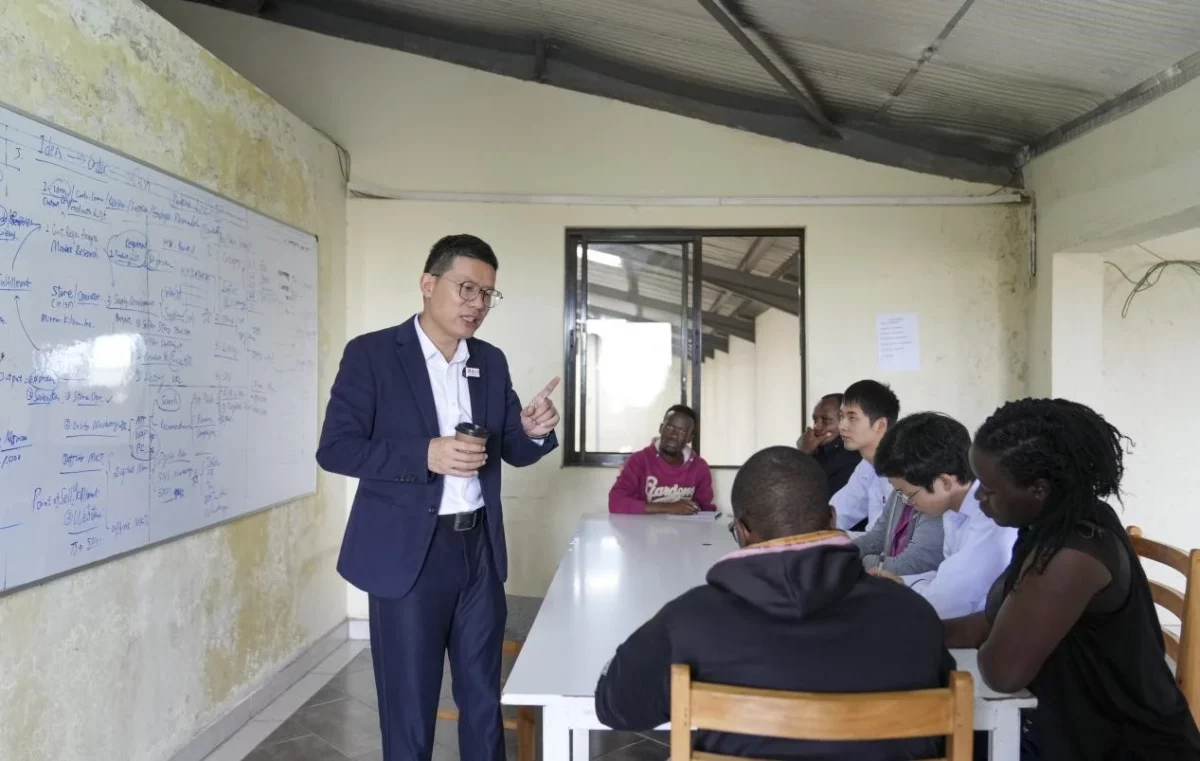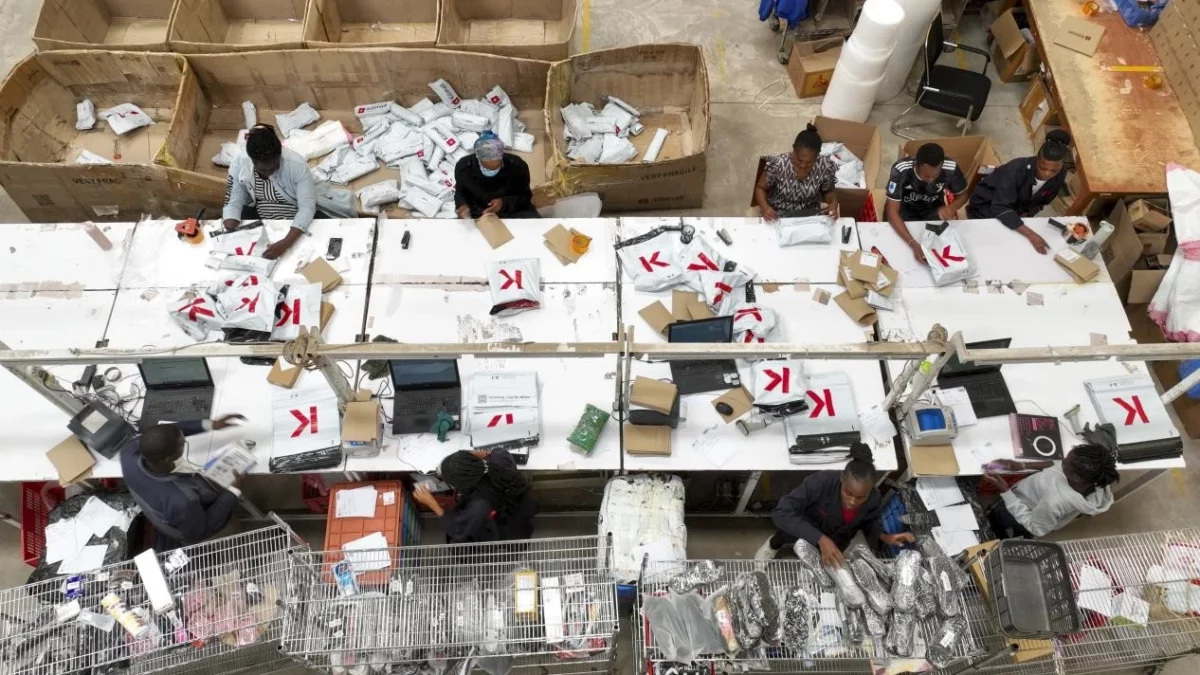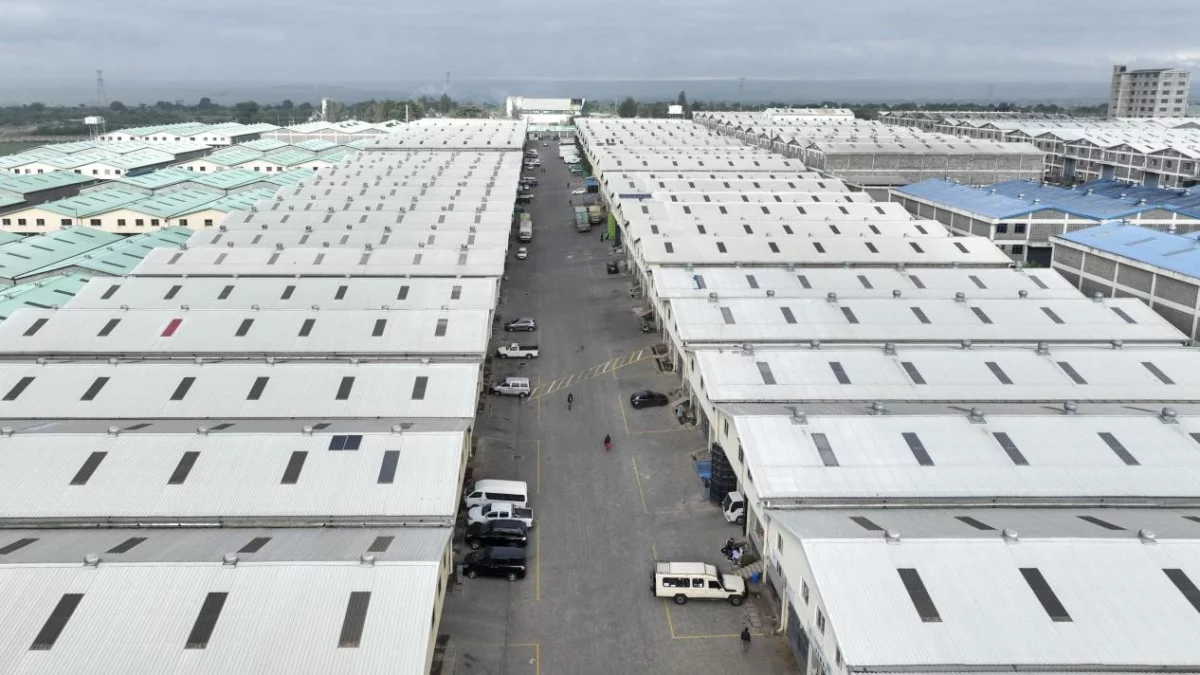In 2014, Yang Tao, a lad from Hunan, founded Kilimall, the first cross-border e-commerce platform launched by Chinese entrepreneurs in Kenya, Africa.
As a new bond and bridge for China-Africa exchanges and cooperation, cross-border e-commerce platforms have injected new momentum into the “Digital Silk Road.” China and Africa have worked hand in hand to share new opportunities and create a better future, heading towards a digital economy era.

In April, Kenya experiences its rainy season with pleasant weather.
As the sun rises from the equator, the snow-capped peaks of Mount Kilimanjaro become clearly visible and glow in the morning light. The downtown area of Nairobi, the capital of Kenya, is bustling with people, and the city is thriving.
At around 09:00 a.m. on April 21, Joram Musyoka, a Kilimall courier, was driving his motorcycle through the crowded Mombasa Road with more than ten parcels.
“Ordered yesterday and received today. The delivery was really fast!” Thirty minutes later, David, who lives on the outskirts of Nairobi, received his parcel and gave a thumbs-up to him.
Operating in Africa for over nine years, Kilimall is now the largest e-commerce platform in East Africa, with 10 million users.
Across mountains and seas, China and Africa have worked together to move towards a win-win path. Based on online shopping platforms like Kilimall, both Chinese and African enterprises have continued to expand their markets along the Belt and Road. Hence Chinese goods have been exported to Africa through the online Silk Road and vice versa. Both sides have drawn up an inspiring blueprint for pragmatic cooperation and joint progress.

A Hunan Entrepreneur’s Brave Venture into Kenya
On April 22, the reporter walked the streets in Nairobi, passing by Kenyans from all walks of life. The young fashionable men and women were laughing and talking with each other in English and Swahili as they carried out their daily hustles.
“What do you think? Africa is different from what you imagined, right?” Yang Tao, founder and CEO of Kilimall, said to the reporter with a smile.
In 2012, Yang Tao from Hunan was sent to Kenya by a Chinese company to build a mobile payment system for the region.
After working in Africa for more than one year, he discovered the potential business opportunities of e-commerce platforms there. “There are many young people in Nairobi. They like pursuing fashion, but they don’t have much choice from physical stores. Plus, online shopping has not yet come in.” Yang Tao felt that there may be a possibility to create an e-commerce platform!
In 2014, in a small two-story building in downtown Nairobi, Kilimall was established.
On the first floor was the office area. At that time, only six people took on multiple roles such as planning, marketing, and customer service. The second floor was used as a bedroom and warehouse. “Back then, I slept in the middle of a pile of goods, with legs curled up.” Yang Tao recalled.
To start an online shopping platform, the first thing is to gain popularity.
Africans have a passion for music and dance. Given this, Kilimall launched a dance competition called “King of Dance” on social media platforms to attract locals to shoot and upload dance videos. This move worked pretty well, and Kilimall gradually gained recognition.
Read Also: Chichwa: A new E-Commerce platform seeks to connect over 500 women-based SMEs in Kisumu
It was not easy to exploit markets. After being live for over a month, Kilimall finally received its first order — a waterproof Bluetooth speaker from a local customer.
Yang Tao was so happy that he delivered the good in person. “At that time, the customer opened the door and said in surprise, ‘You guys are actually not scammers’.”
Then online shopping was not as popular as it is now, and both sellers and buyers didn’t really trust each other. In the opinion of local residents, how could it happen that you just click a mouse at home, and then someone will deliver the goods you bought at a favourable price?
“In Africa, trust is a very valuable ‘commodity’,” Yang Tao said, adding: “As we complete orders one by one, the trust in us is building.” Hunaners are good at patience.
To quickly deliver goods to local consumers, Kilimall has built its logistics system, which makes same-day delivery possible. On the other hand, its self-developed online payment system supports multi-channel transactions in multiple currencies. Meanwhile, it has also set up 1,500 Kilishops, Africa’s version of Cai Niao courier stations, which solves the problem of difficulty and inefficiency of door-to-door delivery due to the absence of a standard door number in most African areas.
At around 3 pm, the reporter saw residents taking deliveries coming and going outside a 15m² Kilishop in Machakos County, Nairobi. The owner, Cynthia Achieng Oluoch, was busy organizing parcels as she dealt with pick-up.
“I’ve been working here for two years. Every day more than 200 deliveries were fetched.” Cynthia Achieng Oluoch told the reporter that after experiencing the convenience of Kilishop, she sniffed an opportunity and persuaded her three friends to open their own Kilishop community store.
The Kilimall courier Joram Musyoka transports a large truckload of deliveries almost every day to Oluoch’s Kilishop. “If you live in Nairobi, orders made before 11 a.m. will normally arrive the same day; otherwise, they will arrive the next day. Our delivery speed is the fastest among all e-commerce companies in Africa.”
The door of trust in online shopping was opened by Kilimall, followed by Alibaba International, Kikuu, Shein, and other Chinese cross-border e-commerce players, which have entered Kenya and other African countries.
After years of efforts by Chinese companies, the e-commerce market in Kenya has matured.

Mutual Export of Quality Commodities between Hunan and Africa
At around 8 a.m. on April 23, local employees wearing Kilimall uniforms walked in groups towards the company at Athi Business Park, Mlolongo town, Machakos County, Nairobi.
“Come, let me show you around.” offers Yvonne Wanjira Maina, Kilimall’s deputy logistics manager in Kenya, waving at the reporter, smiling with her white teeth glistening.
Its warehouse covering an area of above 10,000m2 is the busiest place in Kilimall. From afar, you can see it is well organised, with employees busy with their duties, like sorting goods, printing orders, packaging, and delivery. Therefore, Chinese sellers who entered Kilimall can store their goods here in advance for faster delivery.
Read Also: China Strengthens African Ties for Greater Trade and Development Cooperation
From shoes and hair products made in Shaoyang to kitchen appliances made in Changsha, the reporter saw a great many goods from Hunan in this Kilimall’s warehouse.
Picking up a pair of Hunan-made sneakers, Yvonne Wanjira Maina tells the reporter, “On Kilimall, products from Hunan account for about 10%, and they are often sold out in seconds with discounts.”
Gaudesia Mwende Ngei, a sorter at Kilimall’s warehouse in Kenya, shook her long pigtail proudly as she dealt with just-arrived hair products from Shaoyang, Hunan, for storage, saying to the reporter, “These products are beautiful and of good quality. I’m a big fan of them!”
Thanks to the rapid development of e-commerce business between Hunan and Africa, Shaoyang exported ¥1.39 billion worth of hair products to Africa from January to May this year, accounting for 73.9% of its exports of similar products in the same period.
“We have already established contact with Shaoyang. In the future, more hair products will keep entering the African market,” Yvonne confidently says.
At present, more than one million kinds of products are available on Kilimall, and more than 30,000 kinds of goods are warehoused. During peak periods, an average of one hundred thousand goods are delivered to customers every day.
This year, Yang Tao expects to increase Kilishops to 5,000, set up new warehouses in Tanzania and Uganda, and start an e-commerce business in five to ten African countries.
Through the convenient and smooth online Silk Road, Hunan and Africa have conducted commodity trade.
African youth’s shopping carts are often filled with all kinds of Hunan special goods. It takes a minimum of 14 hours to transport Kenyan roses to Changsha.
In the China-Africa Livestreaming E-Commerce Incubator located at Hunan Gaoqiao Grand Market, African products such as black tea from Kenya, coffee from Ethiopia, chilli sauce from Rwanda, and cashew nuts from Tanzania enjoy a boom in popularity. Recommended by live streamers, they are often snatched up by consumers soon after being sold online.
Taking the organization of the China-Africa Economic and Trade Expo and the construction of a pioneering zone for in-depth China-Africa trade and economic cooperation as an opportunity, trade exchanges between Hunan and Africa have become increasingly close.
With both online and offline efforts, Hunan’s trade with Africa has achieved new growth. In 2022, Hunan-Africa trade reached ¥55.66 billion, ranking eighth in the country and first in central China. In the first five months of this year, Hunan-Africa trade amounted to ¥27.01 billion, a year-on-year increase of 54.5%.

Providing a Stage for African Youth to Chase Their Entrepreneurial Dream
Near noon on April 24, Kilimall’s warehouse was bustling with more than 10 employees moving hundreds of Vitron smart TV sets into the warehouse, which have just been assembled and transported from Vitron’s production plant 10 kilometres away.
Entered Africa in 2004, Chinese enterprise Vitron is engaged in the production and sale of household appliances, such as smart TV sets and refrigerators, in Kenya. Despite good performance in physical stores after years of efforts, its brand hasn’t been widely known.
In 2016, Kilimall offered Vitron an olive branch. The former needed a quality supplier, and the latter wanted popularity, so the two sides hit it off.
“Kilimall has performed extraordinarily in marketing and publicity.” Li Zichen, a Vitron staff, praised, “The continuous dissemination on its social accounts and recommendation updates on its website homepage is much more helpful than the previous banners and billboards.”
After only seven years in Kilimall, Vitron’s brand awareness has increased dramatically, with online sales steadily rising.
“I hope to sell our products all over the African continent through Kilimall.” Li Zichen has new expectations.
Subscribe to Switch TV for more content.
Chinese companies have opened the African market through cross-border e-commerce platforms like Kilimall, which have created a stage for African youth to pursue their entrepreneurial dream.
Silas Musyoka, a post-90s African lad, is the manager of Kilimall’s local seller growth department in Kenya. Previously, he worked at Kilimall’s headquarters in Changsha.
“I miss Changsha’s stir-fried pork with chilli peppers.” he fondly recalls. Talking with the reporter, he sometimes said a sentence or two in Chinese.
Over the three years when he worked in Changsha, he raved about the convenience of e-commerce almost every day. “I want to teach what I had seen and learned in Hunan to young Africans who plan to start their own business on e-commerce platforms.”
Hoswell Macharia is one of his “students”.
Three years ago, Hoswell Macharia, who worked in a bank, quit his steady job and opened a small brick-and-mortar store, yet with unsatisfactory results.
Taking the moment when e-commerce boomed in Africa, he changed his career to open a small online store on Kilimall, specializing in electronic products. From time to time, Silas Musyoka provides online training and guidance to him and helps him analyze basic data and make plans for store promotions.
“I used to be a rookie in the e-commerce business, but now I’m an e-commerce master.” Now his small online store is thriving, with a monthly turnover of up to Ksh 2 million.
“On Kilimall, nearly 3,000 young African entrepreneurs have opened their own stores.” According to Yang Tao, Kilimall currently has a staff of more than 300 people, with more than 70 per cent foreign employees, and has created nearly 20,000 jobs in both China and Africa.
Entering the new era, China-Africa economic and trade cooperation is on a fast track, bringing greater business opportunities to Chinese and African enterprises. “Our goal is to empower one million Chinese and African entrepreneurs and serve one billion Chinese and African consumers.” Yang Tao said ambitiously.
China and Africa together will start a new chapter of online e-commerce trading.
By Hunan Daily All-Media Reporter Peng Kexin,Zhou Yuegui,Gu Pengbo,Wang Jue
















